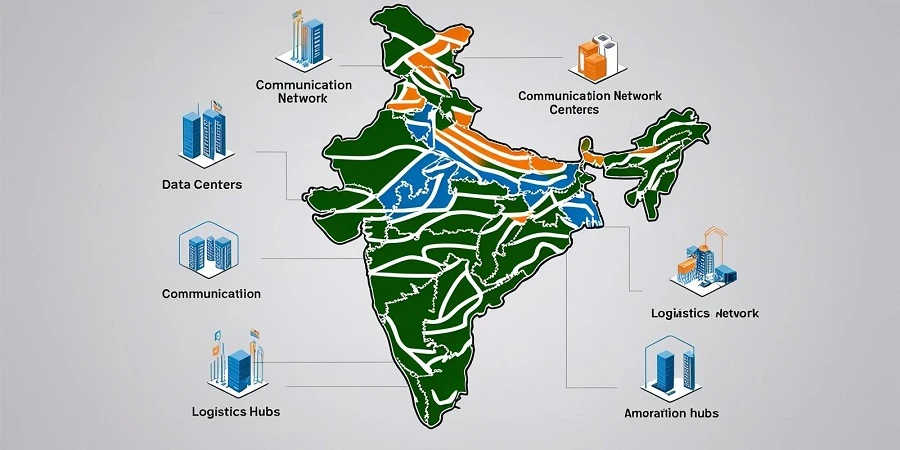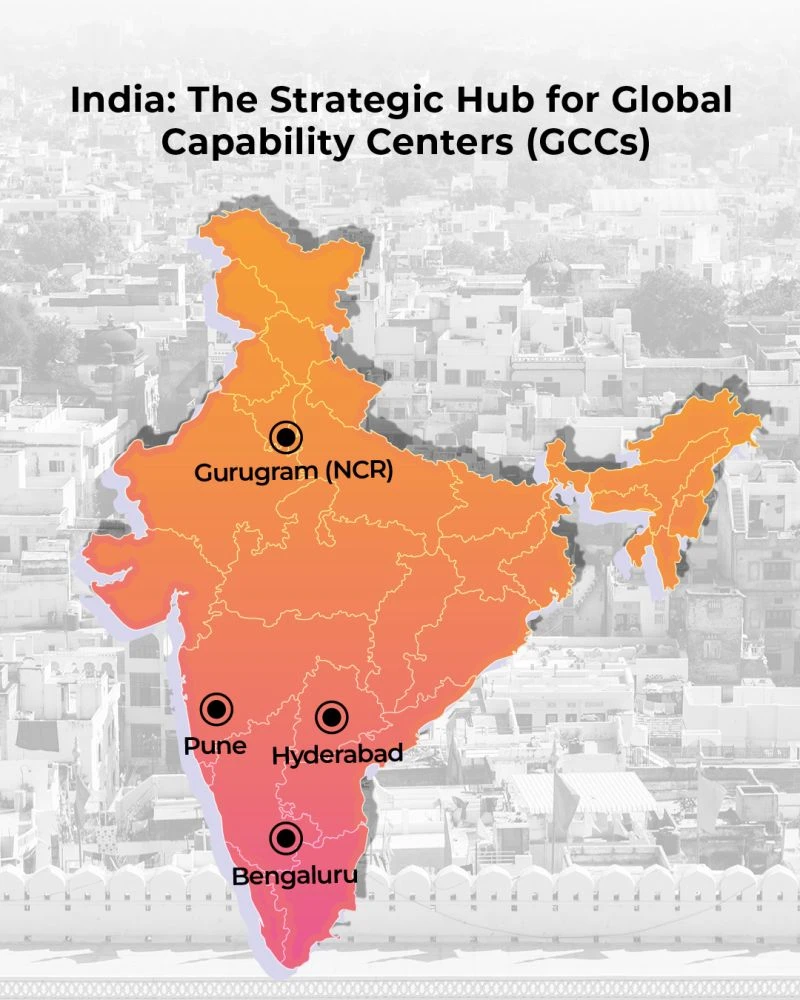The global business landscape has witnessed a remarkable transformation over the past two decades, with India emerging as the undisputed leader in hosting Global Capability Centers (GCCs). What began as basic offshore development centers has evolved into sophisticated hubs of innovation, driving digital transformation and delivering strategic value for multinational corporations worldwide.
At Inductus GCC, we've witnessed firsthand how India has become the preferred destination for companies looking to establish their global operations. With over 1,600 GCCs currently operating across the country and employing more than 1.5 million professionals, India's GCC ecosystem represents one of the most significant shifts in how global enterprises structure their operations.
Understanding the GCC Landscape in India
Global Capability Centers in India have transcended their traditional role as cost arbitrage centers. Today's GCCs serve as strategic business units that drive innovation, manage critical business processes, and contribute significantly to their parent organizations' competitive advantage. These centers handle everything from research and development to customer support, financial services, and cutting-edge technology development.
The evolution of GCCs reflects India's maturation as a global business destination. Major technology companies like Microsoft, Google, and Amazon have established some of their largest development centers outside their home countries in India. Similarly, financial services giants, healthcare companies, and manufacturing enterprises have recognized India's potential to serve as their global nerve centers.

Why India Stands Out as the Premier GCC Destination
India's dominance in the GCC space isn't accidental. Several factors have converged to make the country an attractive proposition for global enterprises. The most significant advantage lies in India's vast talent pool. With over 4.4 million IT professionals and an additional 200,000 graduates entering the workforce annually, India offers unparalleled access to skilled human resources.
The cost advantage remains compelling, though it's no longer the primary driver. Companies can achieve operational cost savings of 40-60% compared to their home countries while maintaining, and often improving, service quality. However, the real value proposition extends beyond cost reduction to include access to specialized skills, round-the-clock operations, and the ability to scale rapidly.
India's robust digital infrastructure has eliminated many of the connectivity and reliability concerns that existed in the early days of offshoring. The country's commitment to digital transformation, evidenced by initiatives like Digital India, has created an environment conducive to sophisticated technology operations.
Strategic Advantages of Establishing GCCs in India
The strategic benefits of Setup Global Capability Centers in India extend far beyond traditional outsourcing advantages. Companies gain access to a diverse talent ecosystem that spans multiple domains, from artificial intelligence and machine learning to biotechnology and financial services. This diversity enables organizations to consolidate various functions under a single roof, creating synergies and improving operational efficiency.
Time zone advantages allow for continuous business operations. While headquarters sleep, GCC teams in India can advance projects, resolve issues, and maintain customer service standards. This 24/7 operational capability has become increasingly valuable in our interconnected global economy.
Innovation capabilities represent another crucial advantage. India GCC are no longer just executing predetermined tasks; they're actively contributing to product development, process innovation, and strategic initiatives. Many global companies have relocated significant portions of their R&D operations to India, recognizing the quality of innovation emerging from these centers.
Key Locations for GCC Establishment
India offers multiple compelling locations for GCC establishment, each with distinct advantages. Bengaluru remains the undisputed technology capital, hosting the highest concentration of GCCs and offering the most mature ecosystem.
The city's advantages include exceptional talent availability, robust infrastructure, and a vibrant startup ecosystem that fosters innovation. Hyderabad has emerged as a strong alternative, particularly for companies in the pharmaceutical, biotechnology, and aerospace sectors. The city offers excellent infrastructure, government support, and competitive operational costs while maintaining high talent quality.
Chennai appeals to companies in manufacturing, automotive, and healthcare sectors. Its strategic location, port connectivity, and strong engineering talent pool make it particularly attractive for organizations with supply chain and manufacturing components.
Pune and the National Capital Region (NCR) including Gurugram and Noida offer proximity to key decision-makers and excellent connectivity. These locations are particularly favored by financial services companies and those requiring frequent interaction with government entities.
Navigating the Regulatory Environment
Understanding India's regulatory framework is crucial for successful GCC establishment. The regulatory environment, while comprehensive, is designed to facilitate business operations while ensuring compliance with local laws. Companies must navigate various regulations including labor laws, tax requirements, foreign exchange management, and industry-specific compliance requirements.
The government has introduced several initiatives to simplify the regulatory process. The single-window clearance system has reduced bureaucratic hurdles, and various state governments offer attractive incentive packages for GCC establishment. However, engaging with experienced local partners or consultants remains essential for smooth navigation of the regulatory landscape.
Tax considerations play a significant role in GCC planning. India offers various tax incentives for technology companies and export-oriented businesses. Understanding transfer pricing regulations, permanent establishment rules, and available tax benefits can significantly impact the financial viability of GCC operations.
Building and Managing Talent Pipeline
Talent acquisition and retention represent the most critical success factors for GCC operations in India. The market for skilled professionals is highly competitive, requiring sophisticated recruitment and retention strategies. Companies must compete not only with other GCCs but also with India's thriving domestic IT industry and startup ecosystem.
Successful talent strategies begin with understanding local market dynamics. Compensation packages must be competitive while considering factors like career growth opportunities, work-life balance, and organizational culture. Many successful GCCs have developed comprehensive talent development programs that enable continuous skill enhancement and career progression.
Building strong partnerships with premier educational institutions can provide sustainable talent pipeline access. Many GCCs collaborate with Indian Institutes of Technology (IITs), Indian Institutes of Management (IIMs), and other leading institutions to identify and develop talent early.

Operational Excellence and Best Practices
Achieving operational excellence in Indian GCC operations requires attention to several critical factors. Establishing robust governance frameworks ensures alignment with global objectives while maintaining local operational flexibility. This includes implementing standardized processes, quality management systems, and performance measurement frameworks.
Cultural integration represents another crucial aspect. Successful GCCs develop strategies that blend global organizational culture with local cultural sensitivities. This includes understanding communication styles, work preferences, and local business practices.
Technology infrastructure must support global standards while remaining cost-effective. This includes implementing secure connectivity solutions, collaboration tools that enable seamless interaction with global teams, and scalable technology platforms that can accommodate rapid growth.
Financial Planning and Investment Considerations
Establishing a GCC in India requires comprehensive financial planning that extends beyond initial setup costs. Companies must consider real estate expenses, talent costs, technology infrastructure, compliance requirements, and ongoing operational expenses. While the overall cost advantage remains significant, proper financial modeling is essential for accurate ROI calculations.
Many companies adopt a phased approach to GCC development, starting with smaller teams and gradually scaling operations based on success metrics. This approach allows for course correction and helps manage financial risks while building organizational capabilities.
Future Outlook and Emerging Trends
The future of GCCs in India looks exceptionally promising, with several emerging trends shaping the landscape. Artificial intelligence and automation are transforming traditional GCC operations, enabling higher-value work and improved efficiency. Companies are increasingly establishing AI and data science centers of excellence within their Indian operations.
Sustainability and ESG considerations are becoming important factors in GCC planning. Companies are focusing on building environmentally sustainable operations while contributing to local community development.
The rise of hybrid work models, accelerated by the pandemic, has opened new possibilities for GCC operations. Companies can now access talent from tier-2 and tier-3 cities, expanding their talent pool while managing costs more effectively.
Conclusion
Setting up a Global Capability Center in India represents a strategic decision that can significantly impact an organization's global competitiveness. The country's unique combination of talent availability, cost advantages, infrastructure quality, and innovation capabilities creates compelling value propositions for global enterprises.
At Inductus GCC, we understand that successful GCC establishment requires careful planning, local expertise, and ongoing commitment to excellence. The Indian GCC ecosystem continues to evolve, offering new opportunities for companies willing to invest in building strategic capabilities.
The question for global enterprises isn't whether to consider India for their GCC operations, but rather how to maximize the tremendous opportunities this dynamic market offers. With proper planning, execution, and local partnerships, companies can establish GCCs that deliver exceptional value while contributing to their long-term strategic objectives.
As India continues its digital transformation journey and strengthens its position as a global innovation hub, the potential for GCC success will only continue to grow. Companies that act strategically today will be best positioned to capitalize on the tremendous opportunities that lie ahead.


